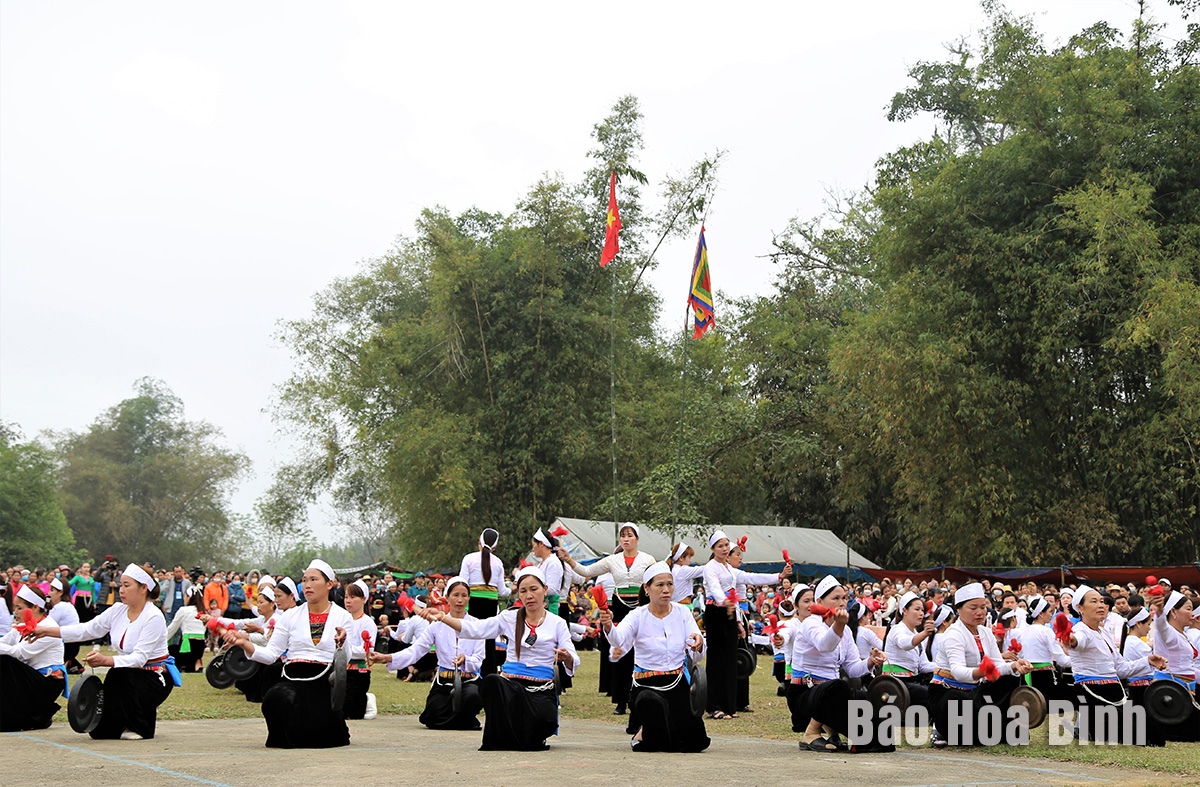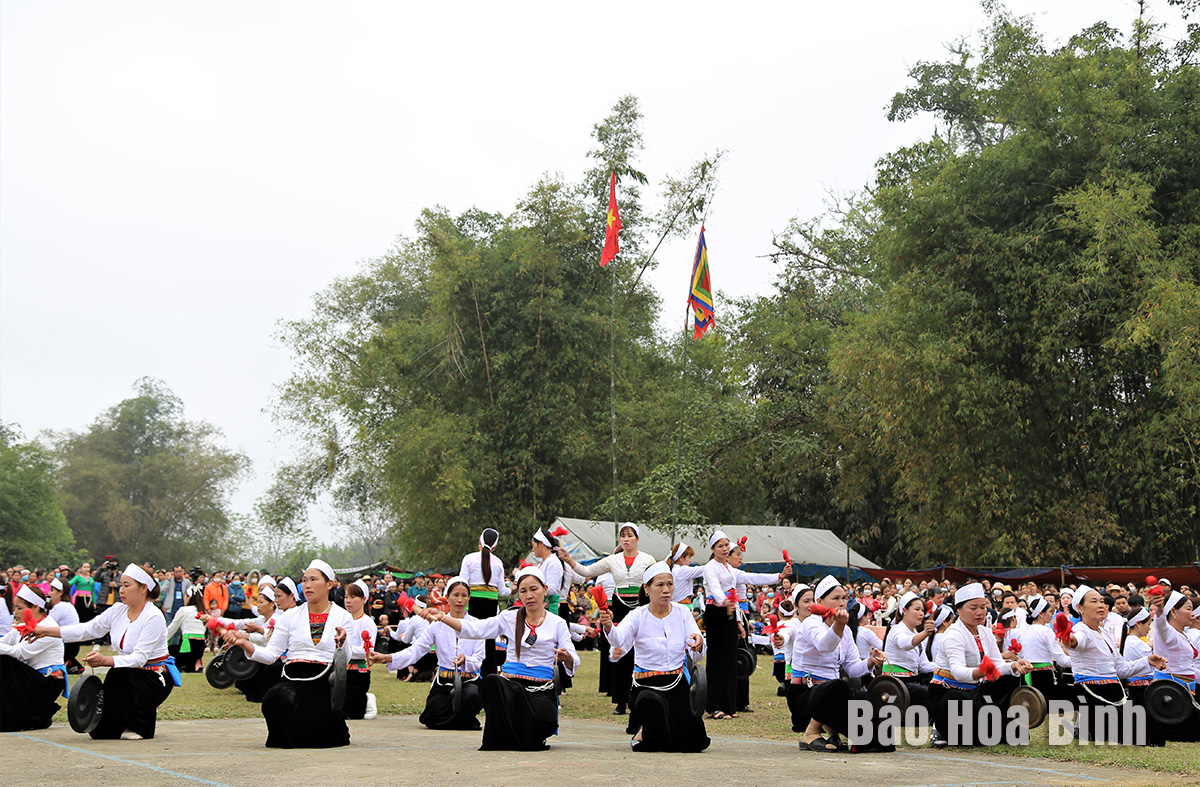
Hoa Binh, a gateway to the Northwestern region, is home to six main ethnic groups, namely Muong, Kinh, Tay, Thai, Dao and Mong, of whom the Muong people account for about 64%. In recent years, with the efforts of Party committees and administrations at all levels and ethnic minorities, the province has achieved encouraging results in preserving and promoting traditional cultural values.

Traditional festivals in the province are organised
to contribute to preserving and promoting the cultural identity of ethnic
groups. Photo taken at Ke Pagoda Festival in Phu Vinh commune (Tan Lac
district).
The preservation and promotion of the cultural heritage
values of the ethnic groups has been given special attention by Party
committees and administrations at all levels. The province has issued a lot of
directive documents, including Resolution No. 04-NQ/TU, dated October 11, 2021
of the provincial Party Committee’s Standing Board on preserving and promoting
the cultural heritage values of ethnic groups in Hoa Binh province for the 2021
– 2025 period, with a vision to 2030.
Quach Thi Kieu, Director of the provincial Department of
Culture, Sports and Tourism, said that the highlight of the work is that the
province has carried out a programme to conduct a general inventory of all intangible
cultural heritage of local ethnic groups. Up to now, the whole province has 786
intangible cultural heritage pieces, including: language, writing, folk
literature, folk performing arts, traditional crafts, social customs and
belief. It owns five national intangible cultural heritages: Mo Muong, Muong
Gong Art, Muong bamboo calendar folk knowledge, Khai Ha traditional festival of
Muong people, and Keng Loong social customs and the belief of Thai people in
Mai Chau district.
On September 8, 2016, the provincial People's Committee
issued Decision No. 2295/QD-UBND on approving the Muong handwritings of Hoa
Binh province. The provincial People's Committee issued Decision No.
1349/QD-UBND, dated June 8, 2019 approving a project on teaching and learning the
Muong ethnic language in the province for the 2018 – 2025 period, with a vision
to 2035. The Department of Education and Training has organised training
courses to build a contingent of experts to teach the Muong language.
In addition, implementing a project to preserve traditional
costumes of the ethnic groups, localities, agencies and units have had many
solutions to encourage officials, members and people to wear traditional
costumes on holidays and anniversaries, and encourage students to wear traditional
costumes in flag-raising ceremonies, and cultural and artistic activities.
With an increasingly vibrant and widespread emulation movement aimed at building cultured residential areas and cultured families, Yen Thuy District has been making steady progress toward improving both the material and spiritual well-being of its people, while fostering a civilized, prosperous, beautiful, and progressive community.
Once lacking recreational spaces and community facilities, Residential Group 2 in Quynh Lam Ward (Hoa Binh City) has recently received attention for the construction of a new, spacious, and fully equipped cultural house. The project followed the model of state support combined with public contributions in both labor and funding.
The "All people unite to build cultural life" movement, which has been effectively integrated with Kim Boi district’s socio-economic development goals, is fostering a lively spirit of emulation across local residential areas, hamlets, villages, public agencies, and enterprises. In addition, through the initiative, traditional cultural values are being preserved and promoted, while community solidarity and mutual support in poverty reduction and economic development are being strengthened.
A working delegation of the Hoa Binh provincial People’s Committee led by its Permanent Vice Chairman Nguyen Van Toan on June 11 inspected the progress of a project to build the Mo Muong Cultural Heritage Conservation Space linked to tourism services in Hop Phong commune, Cao Phong district.
Born and growing in the heroic land of Muong Dong, Dinh Thi Kieu Dung, a resident in Bo town of Kim Boi district, in her childhood was nurtured by the sweet lullabies of her grandmother and mother. These melodies deeply imprinted on her soul, becoming an inseparable part of her love for her ethnic group's culture. For over 20 years, this love for her hometown has driven Dung to research, collect, and pass down the cultural values of the Muong people to future generations.
In the final days of May, the Ethnic Art Troupe of Hoa Binh Province organized performances to serve the people in remote, mountainous, and particularly disadvantaged areas within the province. These were not just ordinary artistic shows, but they were the meaningful journeys aimed at spreading cultural values, enhancing the spiritual life of the people and contributing to the preservation of ethnic minority cultural identities.



